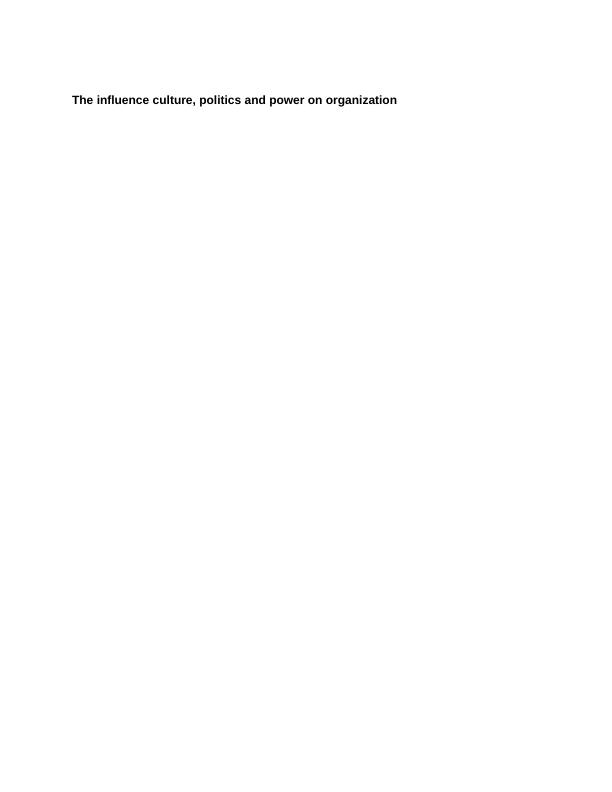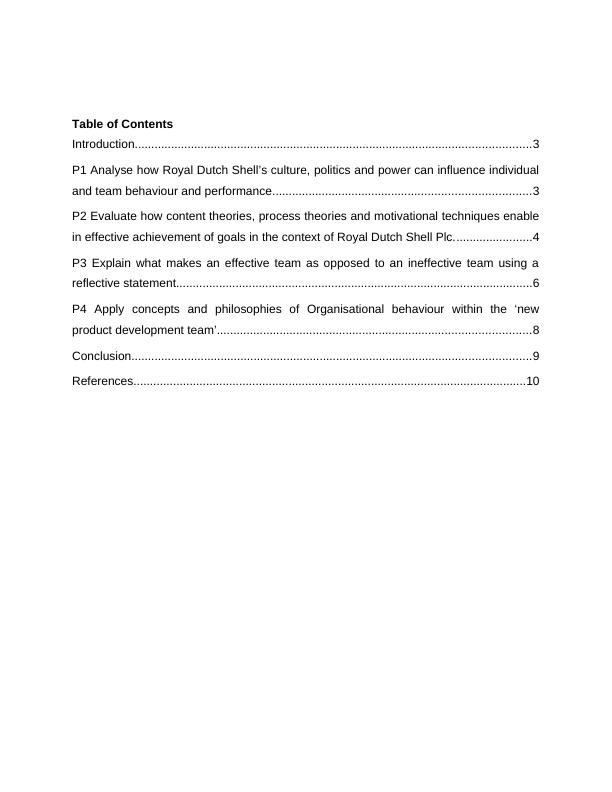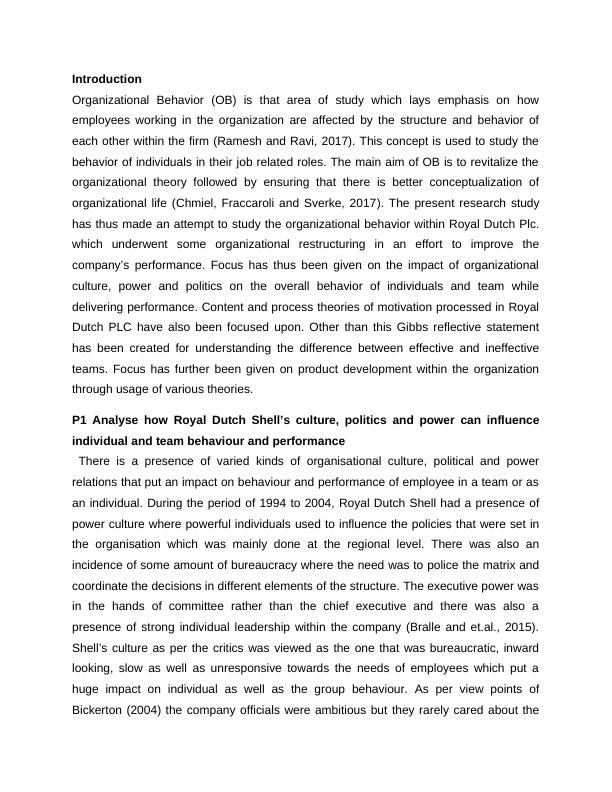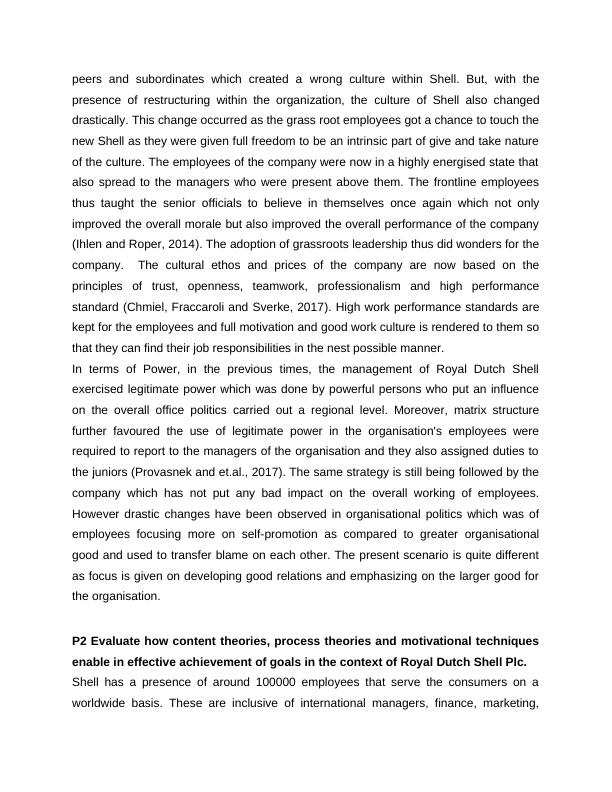Ask a question from expert
The Influence Culture, Politics and Power on Organization
12 Pages3887 Words226 Views
Added on 2020-07-22
The Influence Culture, Politics and Power on Organization
Added on 2020-07-22
BookmarkShareRelated Documents
The influence culture, politics and power on organization

Table of ContentsIntroduction........................................................................................................................3P1 Analyse how Royal Dutch Shell’s culture, politics and power can influence individualand team behaviour and performance..............................................................................3P2 Evaluate how content theories, process theories and motivational techniques enablein effective achievement of goals in the context of Royal Dutch Shell Plc........................4P3 Explain what makes an effective team as opposed to an ineffective team using areflective statement............................................................................................................6P4 Apply concepts and philosophies of Organisational behaviour within the ‘newproduct development team’...............................................................................................8Conclusion.........................................................................................................................9References.......................................................................................................................10

Introduction Organizational Behavior (OB) is that area of study which lays emphasis on howemployees working in the organization are affected by the structure and behavior ofeach other within the firm (Ramesh and Ravi, 2017). This concept is used to study thebehavior of individuals in their job related roles. The main aim of OB is to revitalize theorganizational theory followed by ensuring that there is better conceptualization oforganizational life (Chmiel, Fraccaroli and Sverke, 2017). The present research studyhas thus made an attempt to study the organizational behavior within Royal Dutch Plc.which underwent some organizational restructuring in an effort to improve thecompany’s performance. Focus has thus been given on the impact of organizationalculture, power and politics on the overall behavior of individuals and team whiledelivering performance. Content and process theories of motivation processed in RoyalDutch PLC have also been focused upon. Other than this Gibbs reflective statementhas been created for understanding the difference between effective and ineffectiveteams. Focus has further been given on product development within the organizationthrough usage of various theories. P1 Analyse how Royal Dutch Shell’s culture, politics and power can influenceindividual and team behaviour and performance There is a presence of varied kinds of organisational culture, political and powerrelations that put an impact on behaviour and performance of employee in a team or asan individual. During the period of 1994 to 2004, Royal Dutch Shell had a presence ofpower culture where powerful individuals used to influence the policies that were set inthe organisation which was mainly done at the regional level. There was also anincidence of some amount of bureaucracy where the need was to police the matrix andcoordinate the decisions in different elements of the structure. The executive power wasin the hands of committee rather than the chief executive and there was also apresence of strong individual leadership within the company (Bralle and et.al., 2015).Shell’s culture as per the critics was viewed as the one that was bureaucratic, inwardlooking, slow as well as unresponsive towards the needs of employees which put ahuge impact on individual as well as the group behaviour. As per view points ofBickerton (2004) the company officials were ambitious but they rarely cared about the

peers and subordinates which created a wrong culture within Shell. But, with thepresence of restructuring within the organization, the culture of Shell also changeddrastically. This change occurred as the grass root employees got a chance to touch thenew Shell as they were given full freedom to be an intrinsic part of give and take natureof the culture. The employees of the company were now in a highly energised state thatalso spread to the managers who were present above them. The frontline employeesthus taught the senior officials to believe in themselves once again which not onlyimproved the overall morale but also improved the overall performance of the company(Ihlen and Roper, 2014). The adoption of grassroots leadership thus did wonders for thecompany. The cultural ethos and prices of the company are now based on theprinciples of trust, openness, teamwork, professionalism and high performancestandard (Chmiel, Fraccaroli and Sverke, 2017). High work performance standards arekept for the employees and full motivation and good work culture is rendered to them sothat they can find their job responsibilities in the nest possible manner. In terms of Power, in the previous times, the management of Royal Dutch Shellexercised legitimate power which was done by powerful persons who put an influenceon the overall office politics carried out a regional level. Moreover, matrix structurefurther favoured the use of legitimate power in the organisation's employees wererequired to report to the managers of the organisation and they also assigned duties tothe juniors (Provasnek and et.al., 2017). The same strategy is still being followed by thecompany which has not put any bad impact on the overall working of employees.However drastic changes have been observed in organisational politics which was ofemployees focusing more on self-promotion as compared to greater organisationalgood and used to transfer blame on each other. The present scenario is quite differentas focus is given on developing good relations and emphasizing on the larger good forthe organisation. P2 Evaluate how content theories, process theories and motivational techniquesenable in effective achievement of goals in the context of Royal Dutch Shell Plc. Shell has a presence of around 100000 employees that serve the consumers on aworldwide basis. These are inclusive of international managers, finance, marketing,

End of preview
Want to access all the pages? Upload your documents or become a member.
Related Documents
Organizational Behaviour: Influence of Culture, Politics, and Powerlg...
|13
|3598
|29
Organisational Behaviour Theorylg...
|13
|3809
|69
Organizational Behaviour: Impact of Culture, Politics, Power, Motivation, and Team Formationlg...
|11
|3023
|386
Influence of Organisational Culture, Politics, and Power on Individual and Team Behaviour and Performancelg...
|19
|5805
|2
Organisational Behaviourlg...
|12
|3497
|73
Organizational Behaviour: Analysis of Shell Plc's Culture, Politics, Power, Motivation and Team Development Theorieslg...
|13
|4065
|169